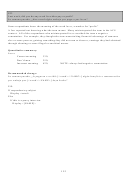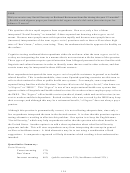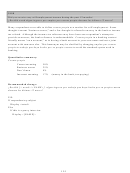Survey Methodology #2003-17 - The American Community Survey (Acs) En Espanol: Using Cognitive Interviews To Test The Functional Equivalency Of Questionnaire Translations - U.s. Bureau Of The Census Page 8
ADVERTISEMENT
The development of English language questionnaires at the Census Bureau typically involves lab
or field pre-testing methodologies. Unlike source language instruments, however, questionnaire
translations are rarely pre-tested prior to data collection. Financial constraints, lack of time, and
lack of qualified bilingual personnel are among the most common reasons why questionnaire
translations are not routinely pre-tested. Perhaps the greatest challenge to managing bilingual
survey instruments is the absence of bilingual survey specialists who can review questionnaire
translations from a survey methodology perspective. For this reason, the issue of functional
equivalence has remained at large. What is functional equivalence and why does it matter?
Questions in multiple languages are said to be functionally equivalent if they are measuring the
same construct, and in doing so take into account fundamental differences between language and
cultural groups (Smith 2002). Some of the reasons why questionnaire translations may not be
functionally equivalent to the source language include use of terms which may not be understood
as intended or may be misinterpreted, as well as words with bias due to pre-existing meaning in
the respondent’s cultural frame of reference. Because the goal of multilingual questionnaires is
to collect valid and reliable data in more than one language, it becomes imperative to have
questionnaire translations that are functionally equivalent to the original (or source) language.
THEORETICAL FRAMEWORK
Literature dealing with cognitive interviews and questionnaire design is vast; however, research
dealing with these issues in bilingual settings appears to be limited at best. Authors writing
about this topic are only beginning to explore the complex relationship between data collection
and bilingualism. Much work is needed to explore data collection methodologies using bilingual
questionnaires, bilingual enumerators, and bilingual respondents. There is also a need for
empirical knowledge about how use of interpreters or use of monolingual questionnaires in
2
ADVERTISEMENT
0 votes
Related Articles
Related forms
Related Categories
Parent category: Legal
 1
1 2
2 3
3 4
4 5
5 6
6 7
7 8
8 9
9 10
10 11
11 12
12 13
13 14
14 15
15 16
16 17
17 18
18 19
19 20
20 21
21 22
22 23
23 24
24 25
25 26
26 27
27 28
28 29
29 30
30 31
31 32
32 33
33 34
34 35
35 36
36 37
37 38
38 39
39 40
40 41
41 42
42 43
43 44
44 45
45 46
46 47
47 48
48 49
49 50
50 51
51 52
52








